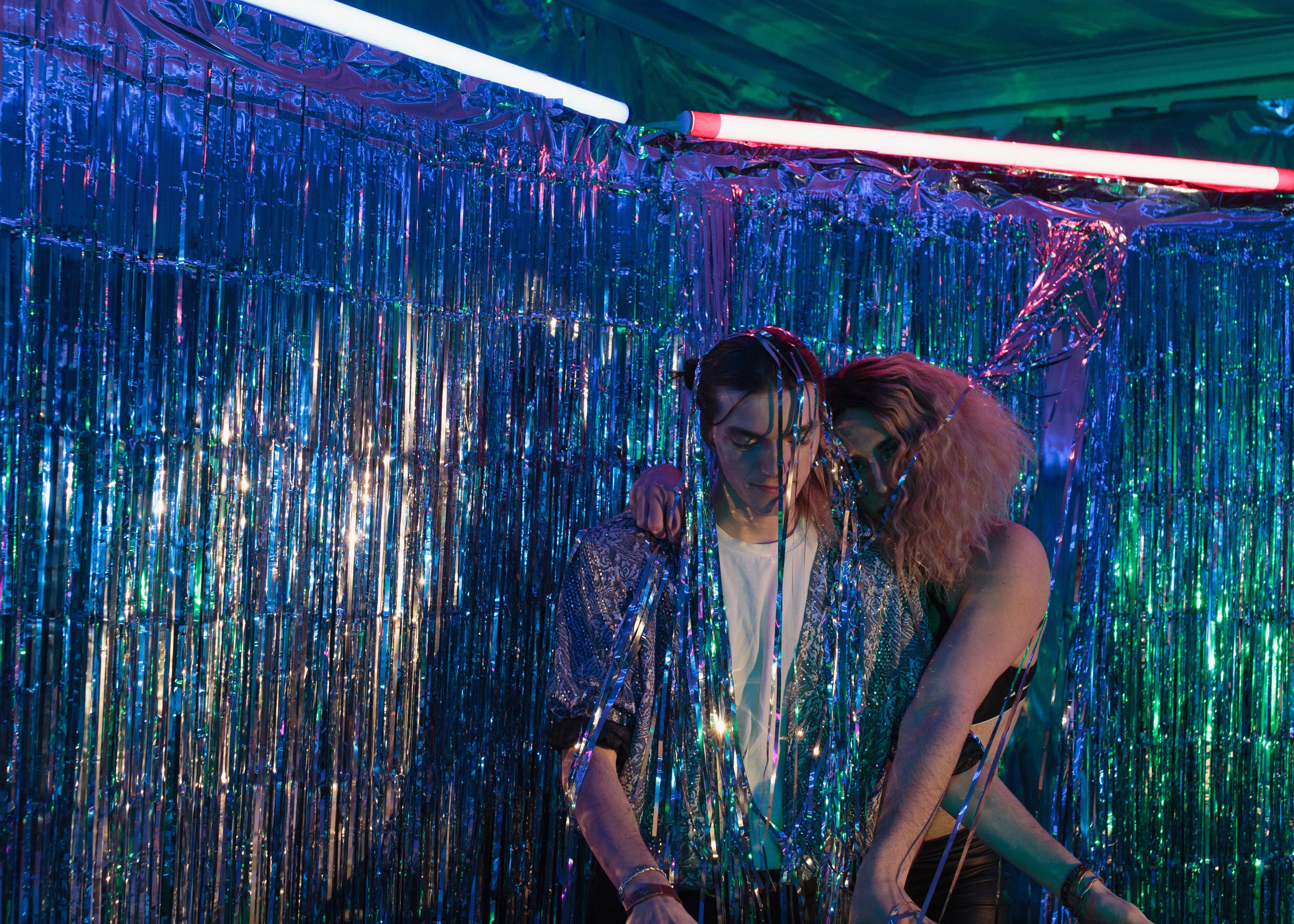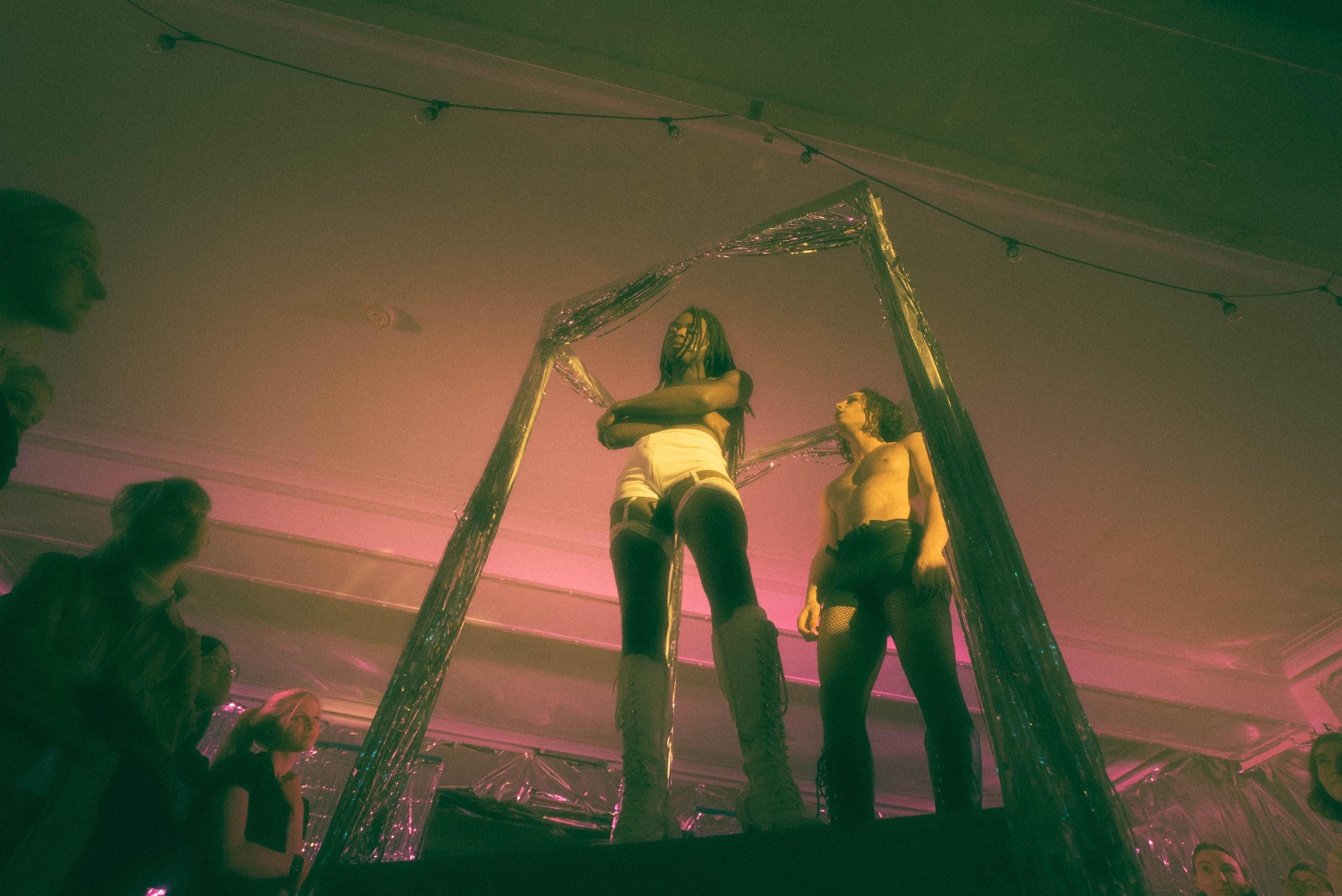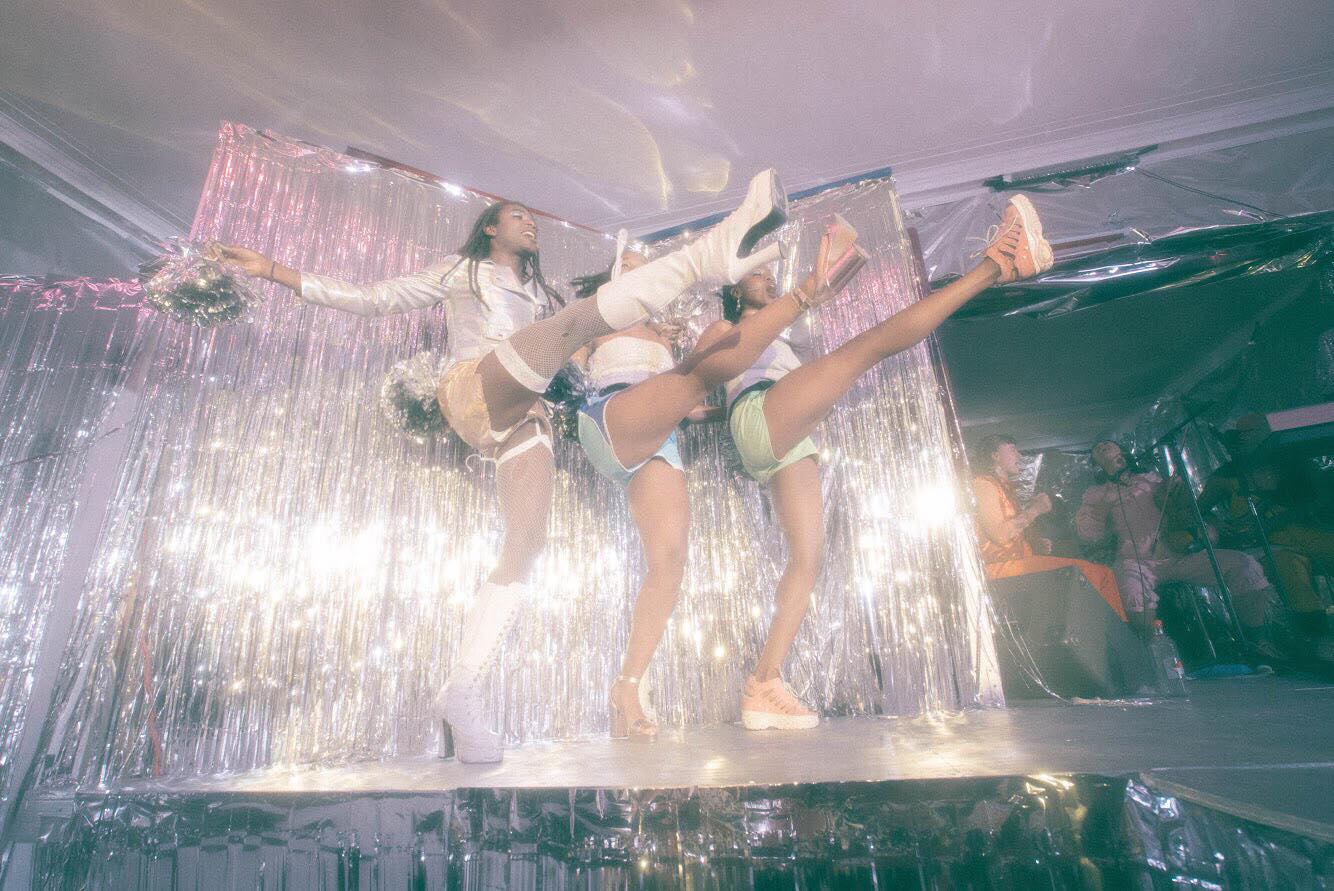
When Isaac Gotterer ’19 first got to work on their Feminist, Gender, and Sexuality Studies (FGSS) thesis last fall, they envisioned an album that would ultimately culminate in a concert. But anyone who had the chance to see the final product, which ran last week from Thursday to Saturday, will know that it was so much more. It was an expression of self, a gender exposé, a call for praxis. And crucially, it was hilarious.
“This is gonna be the most dangerous safe space you’ve ever been in,” Gotterer announced after the show’s opening song, “Trigger Warning,” welcomed the audience into 200 High St. “Or the most safest dangerous space; I haven’t decided yet. I’ll let you know. Actually, you know? You’ll find out all on your own.”
Throughout the show, Gotterer explored themes of trauma, sexuality, and identity. By addressing these topics through a gender demon, a trauma game show, a penis puppet, and a judgmental left ball from LA, Gotterer made the audience laugh about issues that people usually struggle to confront. And it wasn’t just the content that put a reflective glass in front of the viewer; the room itself was designed to to do the same. One of the common spaces inside 200 High had been utterly transformed, covered wall to wall in reflective mylar, the stage backed with silver streamers so that when the lights changed color, so did the energy of the room. The Argus sat down with Gotterer to discuss their vision, creative process, and the team that helped make it come alive.
The Argus: So when did you come up with the idea for your thesis?
Isaac Gotterer: I decided the first two weeks of fall semester. I just had an idea and was like, “I need to do this.” It was better that it wasn’t with the [Theater Department] because I had more freedom. But I just didn’t have the backing of a department in terms of space and equipment so I had to raise all the money on my own, which was stressful but also good.
A: What was your initial idea, and what was the writing process like?
IG: I [knew] I wanted to create a sort a culmination of everything I’ve done [at Wesleyan]. I [knew I wanted] to perform and write. And then I remember, I was going to Olin to do something, and I took an edible before. I didn’t remember I took it. I didn’t even bring my computer, I just sat down at one of the computers and was just like typing things. My first idea was, ‘I want to write an album.’ Just a regular album, and then the play [would be] coming to see the concert of the release of that album.
A: So what was the writing process like?

IG: It took way longer than I thought because as I was writing I had to get the whole team together. It was so tough because I had to like write the skits, and write the music, and write all this stuff, and I can’t play an instrument. I don’t know how to compose music so I needed help from other people, to collaborate with other people. I knew I wanted the first song, “Trigger Warning,” to be a dance, a beat. So then I reached out to people who [I knew] could make that happen.
A: So finding the practical skill set to match your vision.
IG: Yeah, exactly! It was writing, finding people, collaborating. And also thinking about raising money, and like all the academic, institutional bullshit at the same time. Like writing the paper, the artist statement. The writing took a little longer than I would have liked it to; slash, the writing didn’t stop until the first day of the show. Because this is definitely a work in progress, like for sure!
A: How was it to have to work on a project that was also personal and intense within the structure of the academic requirements?
IG: It was tough, for sure. I definitely was disassociating a lot of the time. Thinking about writing these statements and doing all of the academics, and also raising money and making sure everybody else is comfortable and okay. I didn’t leave my house once spring break. I literally stayed in and memorized. Because I was like, “Oh fuck, I have to memorize all of these lines!” All my housemates were gone, in Berkeley together, beautiful Berkeley….while I had to be here alone! But it’s fine…
A: A nice solitary time in Middletown!
IG: And then it all came at me at once, like this is all my secrets. Everything I have to now perform in front of people. So my paper is about tracing trigger warnings and safe spaces through history. A professor, Katherine McKittrich [Associate Professor in Gender Studies and the Graduate Program in Cultural Studies at Queen’s University], wrote that safe spaces are white fantasies that harm the places you come to learn, especially at an institution that is already white supremacist. So like who gets to be safe in a safe space? Who gets to have these spaces? Especially when the performer or person is of trauma. And especially about this on our campus, like in Eclectic, which is historically and institutionally unsafe, and drinking culture and hookup culture—these spaces are unsafe. So how we can subvert these safe space narratives and make them places of accessibility and care?
A: Did you come into Wesleyan knowing you wanted to study FGSS?
IG: No, I thought I was going to be film and English. It was like, “I like movies and I can read!” And then I took a Michael Roth film class and was like, “No.”
A: Did studying FGSS influence your own gender identity and understanding of gender?

IG: Oh, for sure. I think identity comes from knowledge in a lot of ways. Knowledge grounds [identity], but it also fucks with it. [A big thing] about this project was practice-based research, like practice being the research. Rehearsals, creation, writing as research. But it was also a student forum, so some people got credit. A lot of the [concepts from the show], like queer utopia and other things that I am reading, are things that I am thinking about in the artist’s statement and in the writing. It was so cool to be able talk about theory, which is really inaccessible in a lot of ways, in ways that are palatable and consumable.
A: So how did you approach talking about institutional problems while also confronting the fact that you’re a part of these institutional problems?
IG: That was one of the hardest parts. We rewrote part of the script during tech week a lot to talk more explicitly about race, and I knew I wanted to have that conversation and talk about other forms of queerness and expression. But I also don’t feel like I can talk about experiences that are not my own. And so I initially wrote about it in very vague terms, and basically in rehearsal I got called out. So I was like, “Okay, let’s fix this.” How we did that was I literally got called out in the play. I wanted to think about how I’m complicit in my own white guilt. Like putting theory to practice. Praxis. People can talk about it in class, but when you’re confronted with it and even have to perform it…. It’s uncomfy! People don’t like talking about it or looking at it! I’m so happy with everyone [involved] for really starting the dialogue from the beginning.
A: How did you decide to use humor to make people reflect?
IG: Humor has always been a way to mask my own insecurities or things from my life that are hard to talk about. [But] what can make these topics consumable? It’s easier to understand when things are funny. It’s hard to be called out, but what if it’s in a humorous way? Humor is palatable.
A: Does humor make you feel confidant?
IG: People are always like, “You’re so confidant! Yada yada yada!” But the point is…we’re all still figuring it out. We all internalize whatever-the-fuck-a-phobia. We’re all playing the same game. We might be at different points but…. Actually, no. We might be playing way different games. Maybe we’re all playing different games. Aw, I hope I’m playing badminton, that would be so fun.
A: So tell me about the set and costumes?
IG: Jejomar Ysit [’19] did the set design. Amazing. Incredible. Hire him after college everybody. The room was all covered in mylar, which is like this silver reflective [material]. And then he built this platform which was borrowed from the ’92. And then Hope Fourie [’19] did costume design, and she just did a thesis on costume design and gender non-conforming clothing, [focusing] on casual nonbinary clothing. And Zack Lobel [’19] did the lights. It was like the dream team. It was people I’ve trusted since freshman year all coming together for one last hurrah.
A: Did you go in with a vision or did they take creative direction?
IG: So I told them all that I wanted it to be like you were coming to a concert. So thinking about Eclectic, what has been in the space before, what concerts or parties are usually here? It’s usually a stage, and string lights and like four LED lights. So how can we bulk that up by a thousand percent, but still lean into this aesthetic-y but kind of trashy vibe? I wanted people to come in there and not know where they were, for the space [to be] transformed. Like it is a different space. But it’s also inherently going to be [a] place at Wesleyan, and there are things about it we can’t ignore.
A: How do you feel like call-out culture can be productive or limiting?
IG: I mean it matters what kind of spaces, and what is actually progressive in creating dialogue. Part of what I talk about in my artist statement is how the want for a trigger warning and the want for a safe space is just a plea to know that you’re going to not be harmed, and be safe. Yes, that’s not always going to happen. But the reason for calling out is to create a more conscious and safe environment. I think sometimes the ways people are called out doesn’t necessarily do that. But we wanted to think about a space of care and accessibility, and how we can take all of these big things and really talk about them. You’ve probably heard about “calling in” or “assume good intentions,” but I think if you create a space where you are expected to confront being called out…. The rehearsals were a space of mostly minority bodies, and it just is a different make-up of the conversation. You had to talk about it! And we could tell when we were going around certain things, so we’d just be like, [claps] “Come on! We have to talk about it. We’ve just got to talk about it.” And it was interesting because it was for this thing that was going up, but it was also at the same time not just for that.
A: Do you feel like the nature of the content encouraged the people involved to become closer?
IG: It was such a beautifully intense space. I think everyone was constantly thinking about each other, which was really good, but also puts the stakes really high. And because this is so [charged], like we’re talking about sexual assault, we’re talking about race, and so it is so personal. I can talk about something and people are going to connect with it in so many different ways. So there was a lot of conversation always happening.
A: How has the reaction been?
IG: It’s been definitely received with open arms. And throughout the process I’ve been aware that it hits people on similar and different chords, and brings up a lot of stuff for people that’s not about me and my performance at all. But it’s been nothing but love and support, which is awesome. I feel like I’m finally taking a breath. It was a lot in a beautiful way. Also thinking about this as an academic project, and my graders, my readers, are coming to see this! So it’s also this question of “Am I good enough?” Like, is my project good enough? But when it comes down to it, my project is a lot of me, my essence. Being and performing, and then performing being is very dehumanizing in essence. It’s very stripping of personhood. [But] it also makes you so present and seen. And I think this specific story was a spotlight on that.
Sasha Linden-Cohen can be reached at srcohen@wesleyan.edu.



Leave a Reply